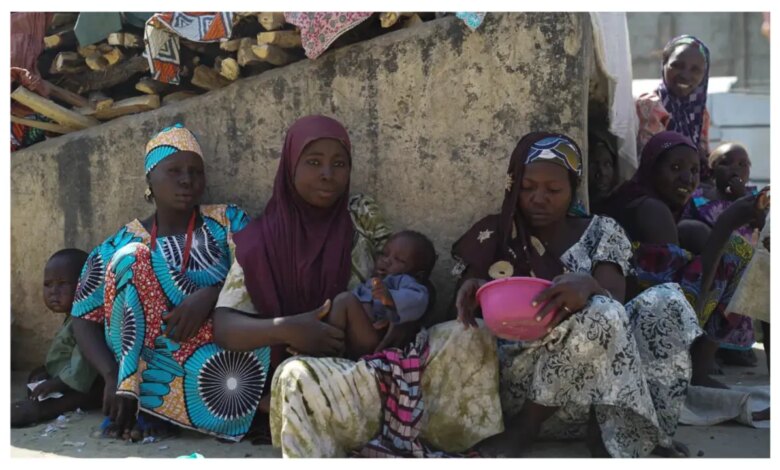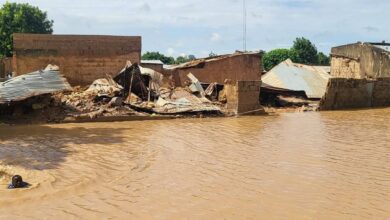Insecurity: Residents raise alarm as 3.7 million face acute hunger in Nigeria’s North East

The recent report by the International Committee of the Red Cross, ICRC, that 3.7 million people were at risk of food insecurity in North East Nigeria did not only raise concern among Nigerians, it also made a mess of the Right to Food Act of 2023.
The Right to Food Act, which came into force in March 2023, mandates the government to ensure food security for Nigerians, but the ICRC’s report and other recent reports have shown the government’s abysmal failure to live up to that mandate, as millions of Nigerians face hunger and malnutrition on a daily basis.
The ICRC has raised the alarm over worsening food insecurity in conflict-affected areas of North East Nigeria, where more than 3.7 million people are currently struggling to access enough food.
According to the Food and Agriculture Organisation (FAO), 3.7 million children in the North East are also malnourished and struggling with stunting, wasting, and anaemia.
The FAO report noted that the most affected states include Yobe, Sokoto, Zamfara, and Katsina, where acute malnutrition has reached Phase Four (Emergency Level) in some local government areas. Maiduguri, Jere, Mobbar, Nganzai, and Mashi are among the locations that are facing dire nutrition crises, with 178,000 children and women from conflict-affected communities most at risk.
Meanwhile, UNICEF has called for bold policy actions to end child food poverty, including strengthening food systems to make nutritious foods more accessible and affordable, expanding nutrition services to prevent and treat malnutrition in early childhood, and enhancing social protection programmes, including cash transfers and food aid for vulnerable families.
The Child Nutrition Fund (CNF) is a UNICEF-led initiative designed to prevent, detect, and treat severe child food poverty and malnutrition. It is hoped that malnourished children will find succour through the CNF.
Earlier this year, the World Food Programme (WFP) had predicted that about 11 million people across the six states in the North East and the North West of Nigeria would be facing acute food insecurity. The report premised the prediction on the persistent insecurity, skyrocketing food and fuel prices, climate shocks, and mass displacement, which would leave millions struggling to access food and essential nutrition.
Another report by UNICEF had also highlighted that one in three Nigerian children under five, approximately 11 million, were experiencing severe food poverty, making them 50 percent more likely to suffer from life-threatening wasting. The report identified inadequate nutrition, aggressive marketing of ultra-processed foods, and economic hardships as key factors driving child food poverty.
The ICRC’s latest report was made known in Abuja on Monday, July 21, by its Public Relations Officer, Aliyu Dawobe. He explained that many of those affected were formerly farmers who had provided for their communities but were displaced due to years of conflict.
The statement noted that violence had forced families away from their homes, restricted access to farmland, and disrupted local food production systems.
Head of the ICRC office in Maiduguri, Diana Japaridze, graphically illustrated the growing pressure on households as the lean season began and food stocks dwindled.
“This is the period when families must begin buying food, but many conflict-affected households simply can’t afford it. They’re forced to drastically limit their intake,” she said.
She added that food insecurity was also fuelling rising rates of malnutrition, particularly among children under five, as well as pregnant and breastfeeding women.
“In response, the ICRC is supporting malnutrition stabilisation centres and offering community education programmes to help families care for vulnerable children.
“To tackle the root causes of food insecurity and support long-term resilience, the ICRC has launched an agricultural assistance programme. The initiative supports both rainy and dry season farming and targets thousands of farming households.
“This year alone, more than 21,000 farming households have received seeds adapted to local conditions, along with planting tools to ease labour and improve efficiency,” she said.
She explained that the support included a mix of field crops and vegetables, such as rice, maize, tomato, and okra, all aimed at increasing dietary diversity and nutritional value.
“Farmers are also being trained in sustainable farming practices to ensure continuity beyond ICRC’s intervention.
“At a systemic level, and in collaboration with the National Agricultural Seed Council (NASC), we recently repaired a vital water source to ensure continuous access for the council’s seed testing and greenhouse facilities,” she added.
In spite of these efforts, Japaridze warned that the lean season remained a critical challenge for many farmers who still could not produce enough to feed their families.
However, the ICRC’s report has again brought to the fore how precarious the issue of food insecurity has become, not only in the North East but also all over Nigeria.
Reacting to the report, some community voices had emphasised the urgency on the ground, charging the government to respond swiftly to avert the impending danger.
A community leader in Dikwa, Modu Umar, decried the current level of food shortage in his locality, saying, “Right now, we face severe food shortages. Some families walk long distances daily just to collect and sell firewood to afford food. Farming is the only real solution.”
Also, a 70-year-old farmer from Gajibo, Churi Ibrahim, painted a bleak picture of the ongoing security risks that people are exposed to while searching for food. He said: “Some people trek three hours just to reach their farms. By the time you get there, you’re exhausted, and returning home takes even longer,” he said.
For Bintu Konto, a mother of five, despite the fear and hardship, local farmers remained determined to brave all odds. “Even when they’re afraid, they still go. If we don’t farm during the rainy season, we’ll have nothing to eat,” she said.
Recall that earlier in the year, a video emerged on social media, where about 40,000 Nigerians, according to the voice in the video, were being received in Niger Republic, where they had run to take refuge, following the biting hardship and hunger afflicting them at the time.
Prior to that incident, Nigerians had taken to the streets in their thousands, in states like Niger, Kano, Oyo, Lagos, and Sokoto, among others, to protest what they called the high cost of essential food items, whose prices suddenly went beyond the reach of ordinary men in the street.
Starting from Niger to Kano, Sokoto, Lagos, Oyo, and Katsina, among other states, the masses sang the same song. They said they could no longer bear the pains of the government’s economic policies, which had made life unbearable and hellish for them. They said most households could no longer afford to buy food in the market, as prices kept rising at an astronomical rate and on a daily basis; a situation they claimed had rendered them less than humans.
With Nigeria ranking among the top 20 countries with the highest burden of severe food poverty, stakeholders stressed that without urgent intervention, the situation could spiral into a full-blown humanitarian disaster.
However, in the Right to Food Act, the Nigerian constitution recognises food as a fundamental human right and obligates the government to make food available, accessible, and affordable to all Nigerians. Regrettably, policy implementation remains weak, and there is no long-term strategy to achieve the law’s objectives.
Executive Director of the Global Initiative for Food Security and Ecosystem Preservation (GIFSEP), Dr Michael Terungwa David, noted that though the Right to Food Act was a constitutional amendment signed into law in March 2023, a law is only as strong as its enforcement, and its enforcement is only as strong as the awareness around it.
“Food is not a privilege; it is a basic human right. Yet, millions of Nigerians still struggle with hunger, malnutrition, and food insecurity. The Right to Food Act is a significant policy that addresses these challenges by ensuring access to nutritious, sufficient, and affordable food for all. It mandates the government to take responsibility for implementing measures that will make food available, accessible, and adequate for every citizen,” he said.
However, the Federal Ministry of Health and Social Welfare said it was implementing some nutrition intervention policies in collaboration with relevant stakeholders.
According to the director and head of the nutrition department at the ministry, Mrs Ladidi Bako-Aiyegbusi, intentional investment in comprehensive nutrition services across the country has the potential to save up to $22 million in healthcare treatment costs related to hunger and malnutrition.
She, therefore, urged lawmakers to ensure pro-nutrition budgetary allocation to key ministries and departments responsible for the delivery of nutrition-specific and -sensitive programmes by ensuring timely release of adequate funds, monitoring expenditures, and making sure monies are properly expended. She urged the legislators to schedule a full-fledged annual debate on nutrition status in their federal constituencies.
For Mallam Sabiu Abubakar, an educationist from the North East, the ICRC’s latest report shouldn’t come as a surprise to anybody who is abreast of the security and environmental issues around the North East region of Nigeria.
“Nobody should be surprised about the report. In fact, the number of people faced with acute shortage of food in the zone could be more if proper data is taken. This situation is so dire that the government needs to respond urgently to avert the looming disaster.
“The combined activities of Boko Haram Islamist sect, bandits, and most recently, Lakurawa, which has prevented farmers from doing their farm work as most people are in the Internally Displaced Persons’ homes, has made it practically impossible for the people to engage in farm work. Therefore, you don’t need any soothsayer to tell you that the people will face acute food shortage.
“Added to that is the recent flood that ravaged most parts of Borno State. It also affected agricultural activities so much that one of the resultant effects is the current food shortage.
“So, apart from making food available as a short-term measure to arrest the situation on ground, the government should be sincere in the fight against insurgency in the area. Security of lives and property of the people should be guaranteed. Once that is done, the people are not lazy; they are hardworking farmers who are able, not only to feed themselves but also other Nigerians outside the zone. So, the government should act fast to flush out all kinds of criminal elements, ranging from Boko Haram to Lakurawa, bandits, killer herdsmen, and kidnappers from the zone so that the people can go back to their homes and resume their normal lives,” he stated.





